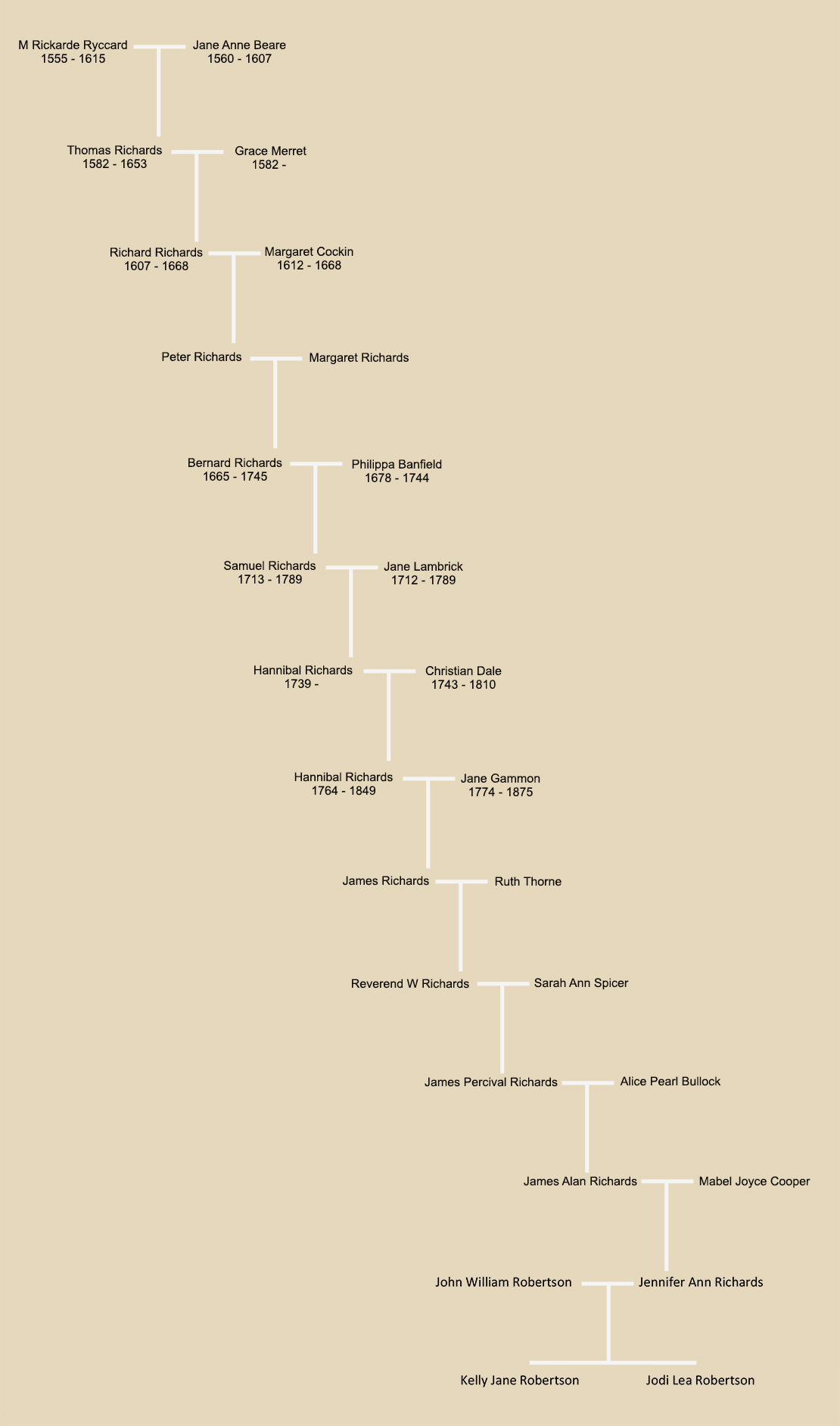Reverand William Richards
b. 1831 Gingeham Devonshire UK
d. 1902
Parents James Richards and Ruth Thorne
Married Sarah Ann Spicer
Child James Percival Richards, Minetta Louisa Richards Grant unknown–1969, Mary Ellen Richards 1868–1948, Frederick William Richards 1869–1936, Frederick William Richards 1869–1957, Florence Maud Richards Moore 1871–1962, Mabel Rose Richards Curtice 1873–1959, Minnie Gertrude Richards 1882–1899, Olive Jessamine Richards Correll 1884–1965
Read - History of Reverend William Richards 1831 - 1902 and his descendants by Jim Richards
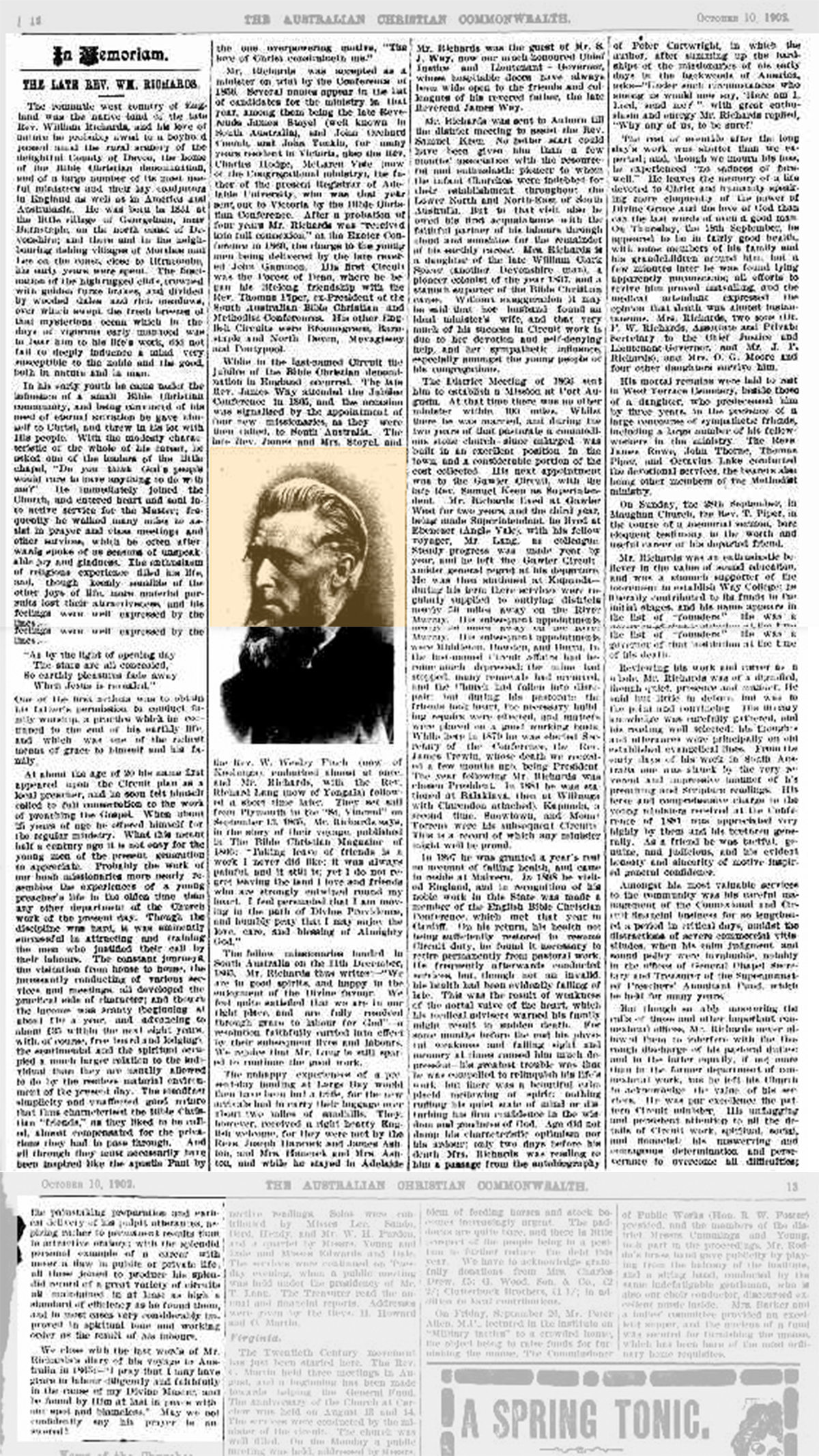
In Memoriam.
THE LATE REV. WM. RICHARDS.
The romantic west country of England was the native 'land of the late Rev. William Richards, and his love of nature he probably owed to a boyhood passed amid the rural scenery of the delightful County of Devon, the home of the Bible Christian denomination, and of a large number of its most useful ministers and their lay coadjutors in England as well as in America and Australasia. He was born in 1831 at the little village of Georgeham, near Barnstaple, on the north coast of Devonshire; and there and in the neighbouring fishing villages of Mortehoe and Lee on the coast, close to Ilfracombe, his early years were spent. The fascination of the high rugged cliffs, crowned with golden furze brakes, and divided by wooded dales and rich meadows, over which swept the fresh breezes of that mysterious ocean which in the days of vigorous early manhood was to bear Mm to Ms life's work, did not fail to deeply influence a mind very susceptible to the noble and the good, both in nature and in man.
In his early youth he came under the influence of a small Bible Christian community, and being convinced of his need of eternal salvation he gave himself to Christ, and threw in his lot with His people.
With the modesty characteristic of the whole of his career, he asked one of the leaders of the little chapel, "Do you think God's people would care to have anything to do with me?"
He immediately joined the Church, and entered heart and soul into active service for the Master; frequently he walked many miles to assist in prayer and class meetings and other services, which he often afterwards spoke of as seasons of unspeakable joy and gladness.
The enthusiasm of religious experience filled his life, and, though keenly sensible of the other joys of life, more material pursuits lost their attractiveness, and his feelings were well expressed by the lines:—
"As by the light of opening day
The stars are all concealed,
So earthly pleasures fade away
When Jesus is revealed."
One of the first actions was to obtain his father's pea-mission to conduct family worship, a practice which he continued to the end of his earthly life, and which was one of the richest meaus of grace to himself and his family.
At about the age of 20 his name first appeared upon the Circuit plan as a local preacher, and he soon felt himself called to full consecration to the work of preaching the Gospel. When about 25 years of age he offered himself for the regular ministry. What this meant half a century ago it is not easy for the young men of the present generation to appreciate. Probably the work of our bush missionaries more nearly resembles the experiences of a young preacher's life in the olden time than any other department of the Church work of the present day. Though tie discipline wa® bard, it was eminently successful in attracting and training the men who justified their call by their labours. The constant journeys, the visitation from house to house, the incessantly conducting of various services and meetings, all developed the practical side of character; and though the income was scanty (beginning at about £10 a. year, and advancing to about £35 within the next eight years, with, of course, free board and lodging), the sentimental aiod the spiritual occupied a much larger relation to the individual than they are usually allowed to do by the restless material environment of the present day. The steadfast simplicity and unaffected good nature that thus characterised the Bible Christian "friends," as they liked to be called, almost compensated for the privations they had to pass through. And all through they must necessarily have been inspired like the apostle Paul by the one overpowering motive, "The love of Christ constraineth me." Sir. Richards was accepted as a minister on trial by the Conference of 1856.
Several names appear in the list of candidates for the ministry in that year, among them being the late Reverends James Stoyel (well known hi South Australia), and John Orchard Coomb, and John Tonkin, for many years resident in Victoria, also the Rev. Charles Hodge, McLaren Vale (now of the Congregational ministry), the father of the preseuft Registrar of Adelaide University, who was that year sent out to Victoria by the Bible Christian Conference.
After a probation of four years Mr. Richards was "received into full connexion," at the Exeter Conference in 1860, the charge to the young men being delivered by the late revered John Gammon*
His first Circuit was the Forest of Dean, where he began his lifelong friendship with the Rev. Thomas Piper, ex-President of the South Australian Bible Christian and Methodist Conferences.
His other English Circuits were Broomsgreen, Barnstaple and North. Devon, Mevagissey and Pontypool. While in the last-named Circuit the jubilee of the Bible Christian denomination in England occurred. The late Rev. James Wlay attended the Jubilee Conference in 1865, and the occasion was signalised by the appointment of four new missionaries, as they were then called, to South Australia. The late Rev. James and Mrs. Stoyel, and the Rev. W. Wesley Finch (now of Koolunga), embarked almost at once, and Mr. Richards, with the Rev. Richard Dang (now of Yongala) followed a short time later.
They set sail from Plymouth in the "St. Vincent" on September 13, 1865. Mr. Richards says, in the story of their voyage, published in The Bible Christian Magazine of 1866:—"Taking leave of friends is a work I never did like; it was always painful, and it still is; yet I do not regret leaving the land I love and friends who are strongly entwined round my heart. I feel persuaded that I am moving in the path of Divine Providence, and humbly pray that I may enjoy the love, care, and blessing of Almighty God."
The fellow missionaries landed in South Australia on the 11th December, 1805. Mr. Richards thus writes:—"We are in good spirits, and happy in the enjoyment of the Divine favour. We feel quite satisfied that we are in our right place, and are fully resolved through grace to labour for God"—a resolution faithfully carried into effect by their subsequent lives and labours. We rejoice that Mr. Lang is still spared to continue the good work. The unhappy experiences of a present-day landing at Largs Bay would then have been but a trifle, for the now arrivals had to carry their luggage over about two miles of sandhills. They, however, received a rig]it hearty English welcome, for they were met by the Revs. Joseph Hancock and James Ashton, and Mrs. Hancock and Mrs. Ashton, and while he stayed in Adelaide Mr. Richards was the guest of Mr. S. J. Way, now our much-honoured Chief Justice and Lieutenant - Governor, whose hospitable doons have always been wide open to the friends and colleagues of his revered father, the late Reverend James Way.
Mr. Richards was sent to Auburn till the district meeting to assist the Rev. Samuel Keen. No better start could have been given him than a few mouths' association with the resourceful and enthusiastic pioneer to whom the infant Churches were indebted for their establishment throughout the Lower North and North-East of South Australia. But to that visit also he owed his first acquaintance with the faithful partner of his labours through cloud and sunshine for the remainder of his earthly career. Mrs. Richards is a daughter of the late William Clark Spicer (another Devonshire man), a pioneer colonist of the year 1837, and a staunch supporter of the Bible Christian cause. Without exaggeration it may be said that her husband found an ideal minister's wife, and that very much of his success in Circuit work is due to her devotion and self-denying help, and her sympathetic influence, especially amongst the young people of his congregations.
The District Meeting of 1866 sent him to establish a Mission at Port Augusta.
At that time there was no other minister within 100 miles. Whilst there he was married, and during the two years of that pastorate a commodious stone church—since enlarged—was built in an excellent position in the town, and a considerable portion of the cost collected. His next appointment was to the Gawler Circuit, with the late Rev. Samuel Keen as Superintendent.
Mr. Richards lived at Gawler West for two years, and the third year, being made Superintendent, he lived at Ebenezer (Angle Vale), with his fellow voyager, Mr. Lang, as colleague. Steady progress was made year by year, and he left the Gawler Circuit amidst general regret at his departure. He was then stationed at Kapunda— during his term there services were regularly supplied to outlying districts nearly 50 miles away on the River Murray. His subsequent appointments were Middleton, Bowden, and Burra. In the last-named Circuit affairs had become much depressed; the mine had stopped, many removals had occurred, and the Church had fallen into disrepair; but during his pastorate the friends took heart, the necessary building repairs were effected, and matters were placed on a good working basis. While here in 1S79 he was elected Secretary of the Conference, the Rev. James Trewin, whose death we recorded a few months ago, being President.
The year following Mr. Richards was chosen President. In 1881 he was stationed at Balaklava, then at Willunga with Clarendon attached), Kapunda, a second time, Snowtown, and Mount Torrens were his subsequent Circuits Tills is a record of which any minister might well be proud.
In 1897 lie was granted a year's rest on account of failing health, and came to reside at Malvern. In 1898 he visited England, and in recognition of his noble work in this State was made a member of the English Bible Christian Conference, which met that year in Cardiff. On his return, his health not being sufficiently restored to resume Circuit duty, he found it necessary to retire permanently from pastoral work. He frequently afterwards conducted services, but, though not an invalid, his health had been evidently failing of Lite. This was the result of weakness of the aortal valve of the heart, which his medical advisers warned his family might result iu sudden death. For some mouths before the end his physical weakness and failing sight and memory at times caused him much depression—his greatest trouble was that he was compelled to relinquish his life's work—but there was a beautiful calm placid mellowing of spirit; nothing ruffling his quiet state of mind or disturbing his firm confidence in the wisdom and goodness of God. Age did not damp his characteristic optimism nor his ardour; only two days before- his death Mrs. Richards was reading to him a passage from the autobiography • of Peter Cartwright, in which the author, after summing up the hardships of the missionaries of his early days in the backwoods of America, asks—"Under such circumstances who among us would now say, 'Here am 1, Lord, send me V' "—with great enthusiasm and energy Mr. Richards replied, "Why any of us, to be sure!" The rest of eventide after the long day's work was shorter than we expected; and, though we mourn his loss, he experienced "no sadness of farewell."
He leaves the memory of a life devoted to Christ and humanity speaking more eloquently of the power of Divine Grace and the love of God than can the last words of even a good man.
On Thursday, the 18th September, he appeared to be in fairly good health, with some members of his family and his grandchildren around him, but a few minutes later he was found lying apparently unconscious; all efforts to revive him proved unavailing, and the medical attendant . expressed the opinion that death was almost instantaneous.
Mrs. Richards, two sons (Dr. F. W. Richards, Associate and Private Secretary to the Chief Justice and Lieutenant-Governor, ana Mr. J. P. Richards), and Mrs. O. G. Moore and four other daughters survive him. His mortal remains were laid to rest in West Terrace Cemetery, beside those of a daughter, who predeceased him by three years, in the presence of a large concourse of sympathetic friends, including a large number of his fellow workers in the ministry. The Revs. James Rowe, John Thorne, Thomas Piper, and Octavius Lake conducted the devotional services, the bearers also being other members of the Methodist ministry.
On Sunday, the 28th September, in Maughan Church, the Rev. T. Piper, in the course of a memorial sermon, bore eloquent testimony to the worth and useful career of his departed friend. Mr. Richards was an enthusiastic believer in the value of sound education, and was a staunch supporter of the movement to establish Way College; he liberally contributed to its funds in the initial stages, and his name appears in the list of "founders." He was a governor of that institution at the time of his death.
Reviewing his work and career as a whole, Mr. Richards was of a dignified, though quiet, presence and man tier. He said but little in debate, but was to the point and convincing. His literary knowledge was carefully gathered, and his reading well selected; his thoughts and utterances were principally on old established evangelical lines. From the early days of his work in South Australia one was struck by the very reverent and impressive manner of his preaching and Scripture readings. His terse and comprehensive charge to the young ministers received at the Conference of 1881 was appreciated very highly by them and his brethren generally. As a friend he was tactful, genuine, and judicious, and his evident honesty and sincerity of motive inspired general confidence.
Amongst his most valuable services to the community was bis careful management of the Connexional and Circuit financial business for so lengthened a period in critical days, amidst the distractions of severe commercial vicissitudes, when his calm judgment and sound policy were invaluable, notably in the offices of General Chapel Secretary and Treasurer of the Superannuated Preachers' Annuitant Fund, which lie held for many years. But though so ably answering the calls of these and other important connexional offices, Mr. Richards never allowed them to interfere with the thorough discharge of his pastoral duties; and iu the latter equally, if not more than in the former department of connexional work, has he left his Church to acknowledge the value of his services. He. was par excellence the pattern Circuit minister. His unflagging and persistent attention to all the details of Circuit work, spiritual, social, and financial; his unswerving and courageous determination and perseverance to overcome all difficulties; the painstaking preparation and earnest delivery of his pulpit utterances, aspiring rather to permanent results than to attractive oratory; with the splendid personal example of a career with never a flaw in public or private life; all these joined to produce his splendid record of a great variety of circuits all maintained in at least as high a standard of efficiency ais lie found them, and in most cases very considerably improved in spiritual tone and working order as the result of his labours. We close with the last words of Mr. Richard s's diary of his voyage to Australia in 1865:—"I pray that I may have grace to labour diligently and faithfully in the cause of my Divine Master, and found by
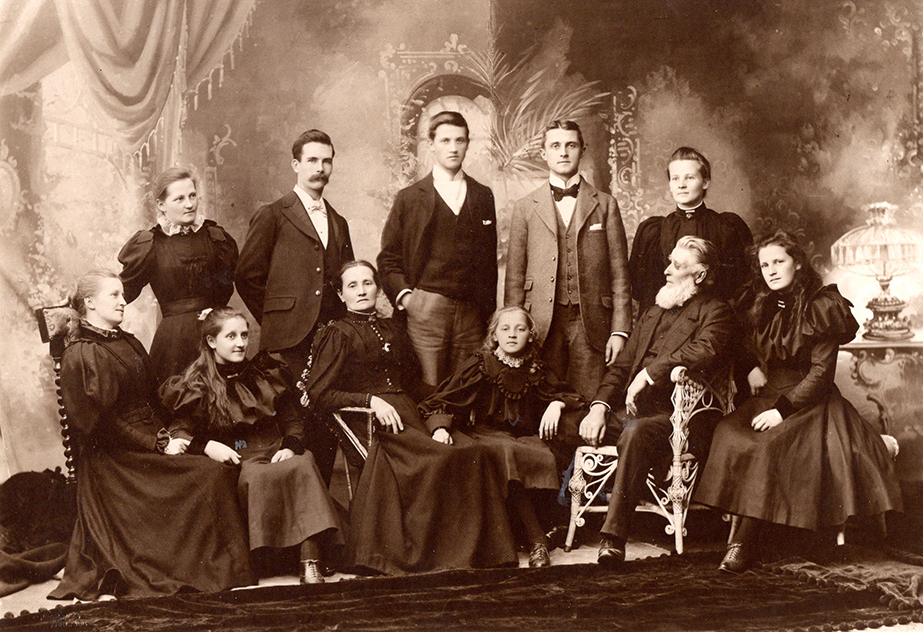
Rev. William Richards and Sarah Spicer with their family. Centre back is James Percival Richards.
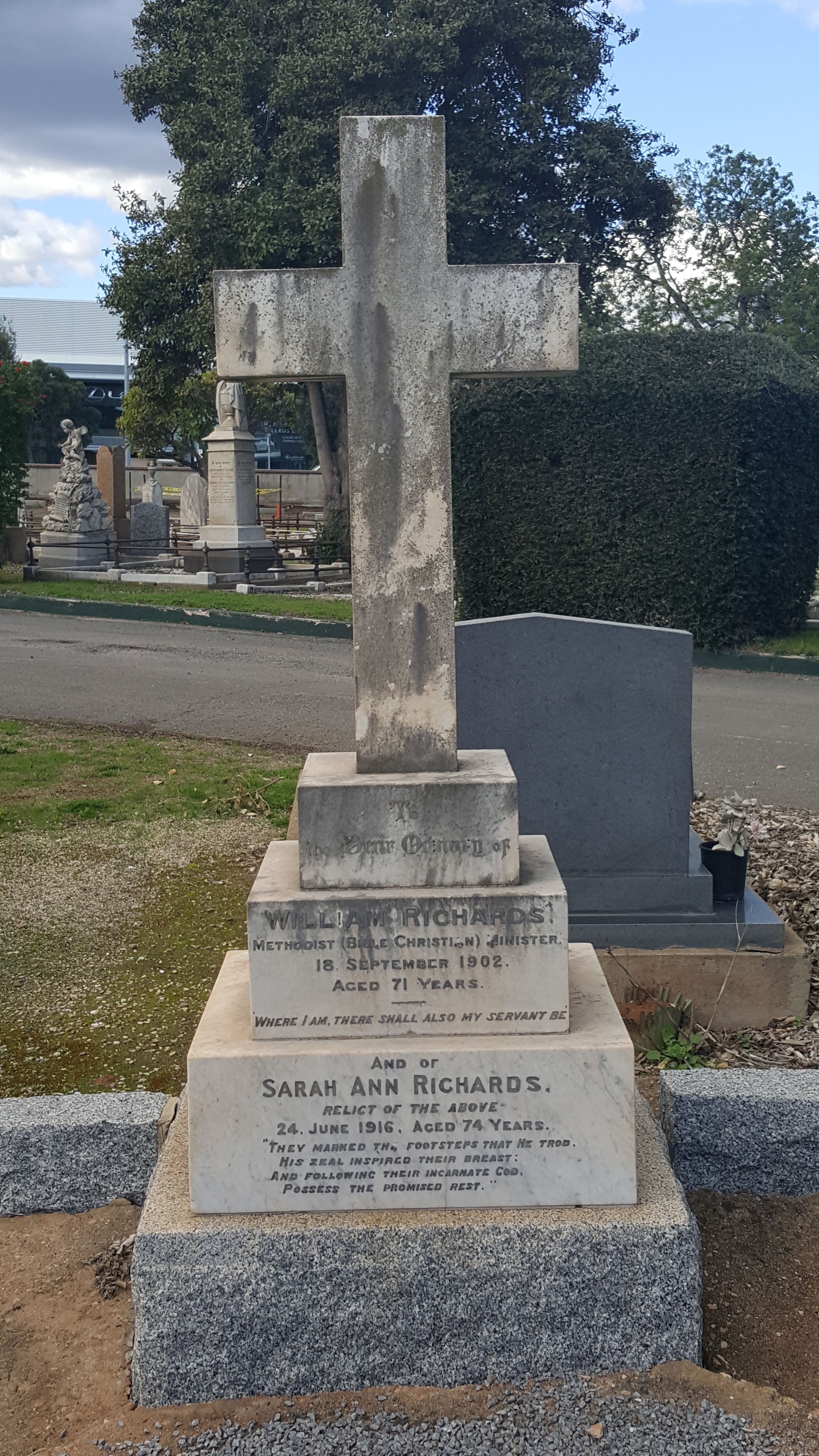
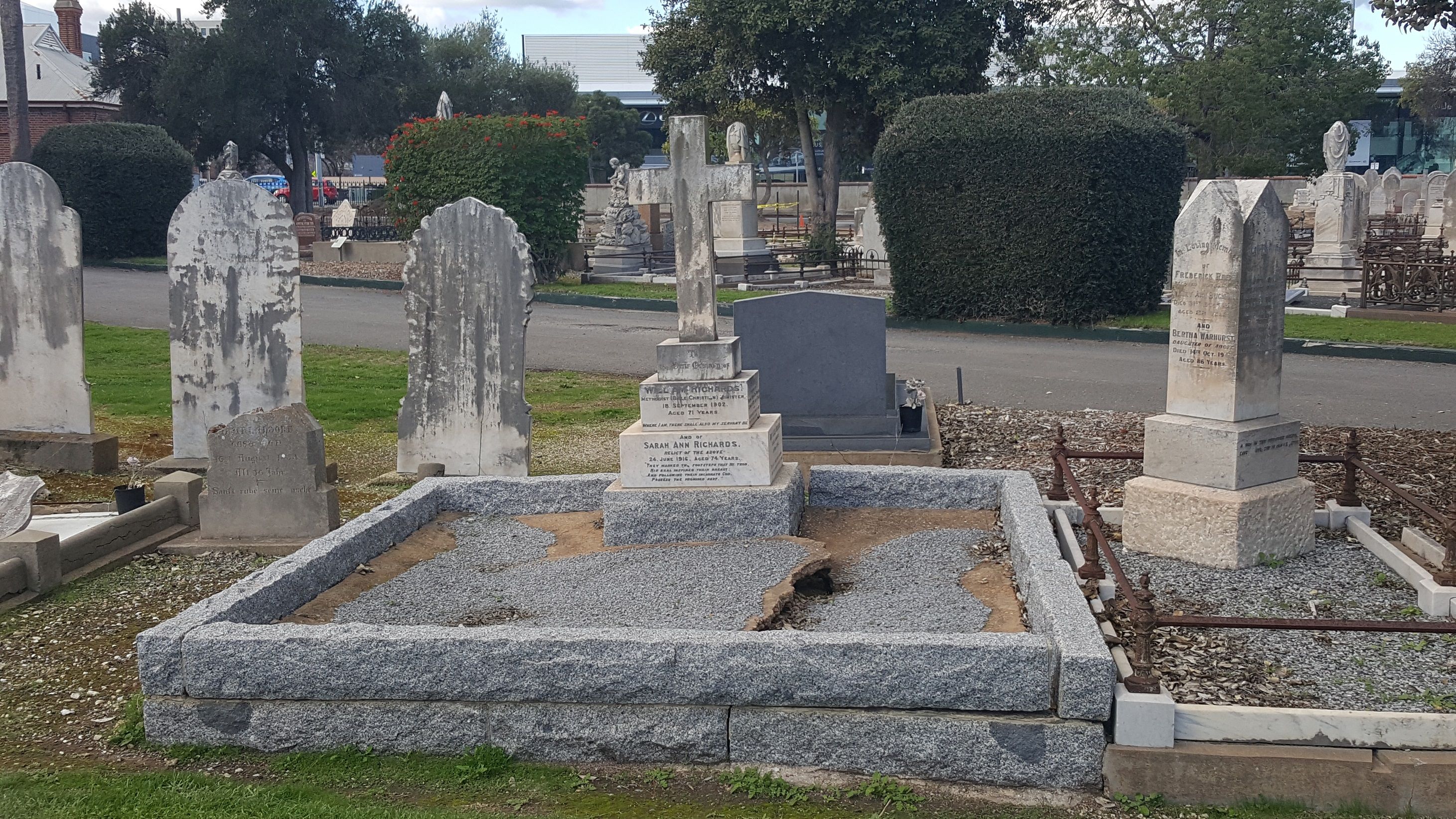
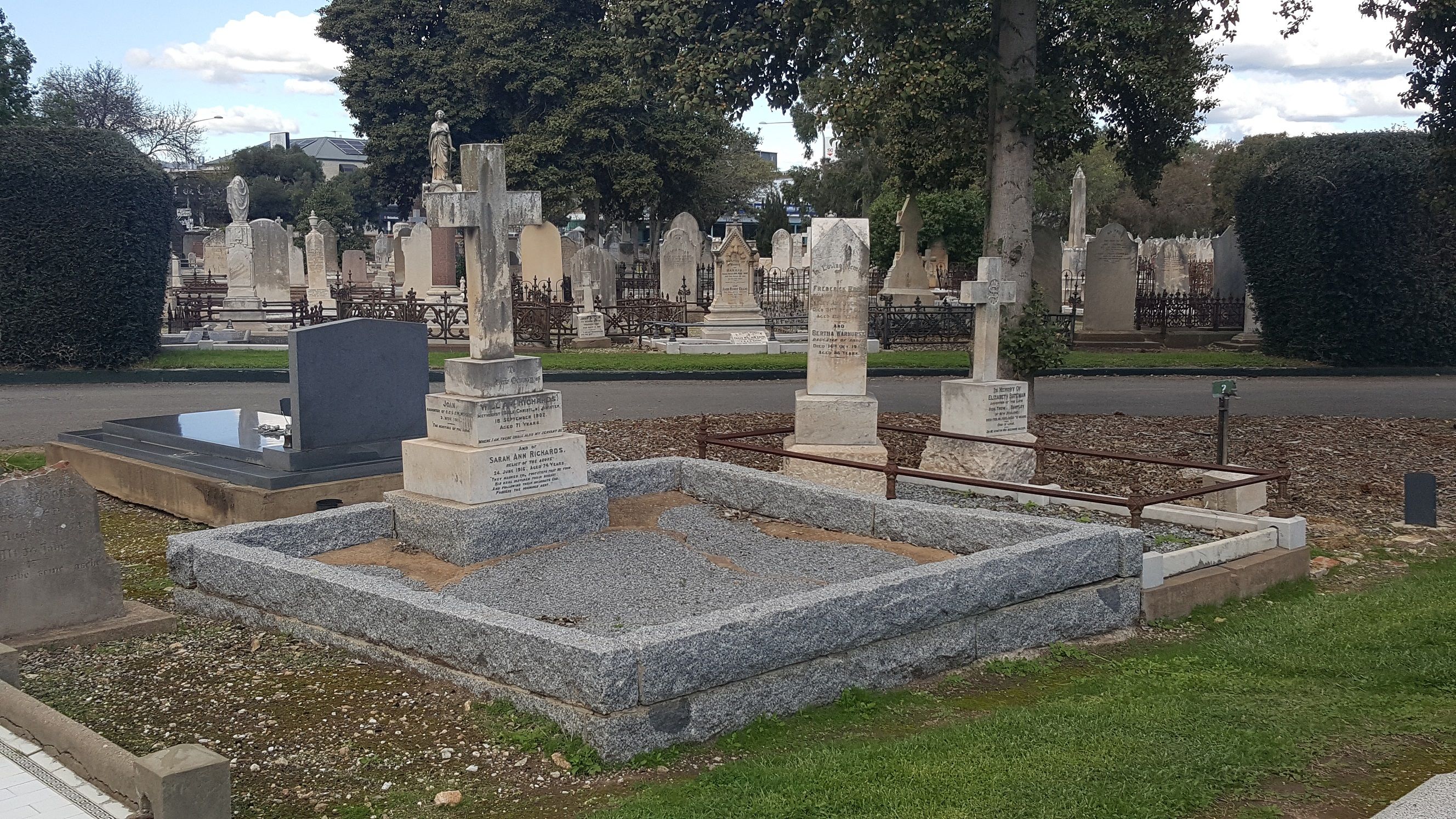
Richards Tree
*If a Family Tree image has that it is linked to interactive PDF, once the Family Tree image is clicked it will open a PDF you can then click on either the names or faces to go to that relatives page.
*Names throughout the site that are coloured blue are linked to that persons page.

